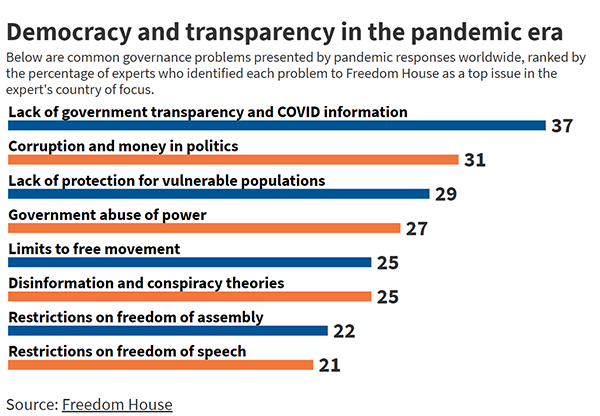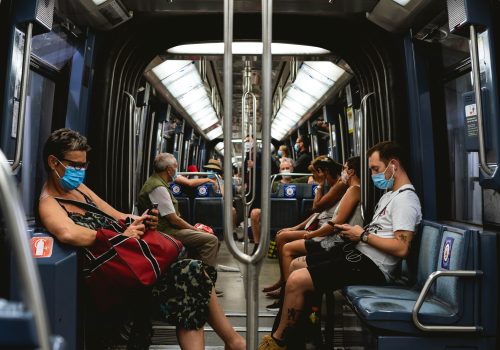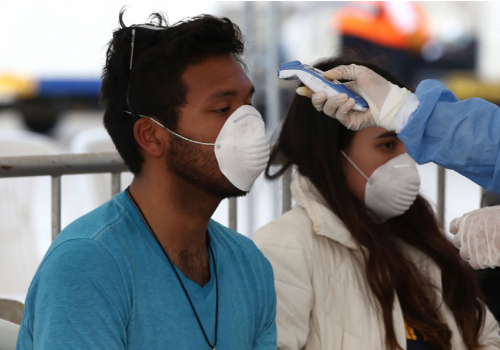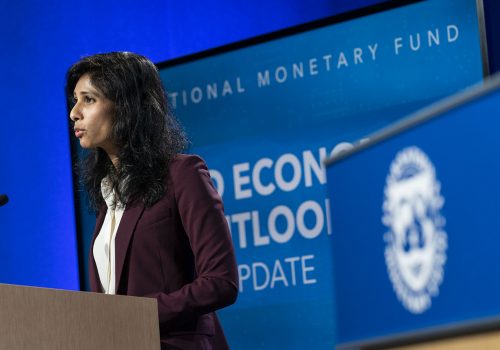The future is here: A guide to the post-COVID world 10/16/2020
Welcome to your guide to where the world is headed during the pandemic era and beyond. Each week, we’ll bring you the latest and most significant expert insights and international news about how coronavirus is reshaping international affairs. To stay updated each week, sign up to the newsletter here.
Let’s take a spin around the globe, in seven minutes or less.
In top stories this week:
- How much will it cost to vaccinate one billion people? The World Bank chips into the effort to find an answer.
- China gets another boost from trade, while other countries stall near the starting line of economic recovery.
- An angry old woman, and the complaints she inspired, have doomed a mask-wearing campaign in Berlin.
- But first…
The big story
This week’s key theme: The future belongs to agile democracies
As if 2020 wasn’t already overloaded by crises, there’s another one brewing. Democracy has been in retreat around the world for the past fourteen years. But according to a new report by Freedom House, it has weakened in eighty countries just since the pandemic began, as governments—particularly struggling democracies and repressive states—grant themselves extraordinary powers to respond to COVID-19.
Democracies hoping to win the increasingly pitched tug of war with autocracy in this new world will need to “become faster and more agile, [and] increase the ability to agree on priorities, drive strategies, and stick with the strategies through changes in governments and administrations,” argues John Raidt, a nonresident senior fellow, in an interview with the Atlantic Council’s Foresight, Strategy, and Risks initiative.
And while the current crisis of democracy won’t result in a full swing to autocracy—democracy “appeals to the human spirit in a way that no autocracy can ever match,” argues Raidt—it will have consequences for democratic governance that persist well past the pandemic era.
Subscribe to The future is here: A guide to the post-COVID world
Sign up for a weekly roundup of top expert insights and international news about how coronavirus is reshaping international affairs.

The danger of a dis-United States of America
Though it may be the world’s most powerful democracy, the United States “has not presented a very attractive political model of late” for others, including “young democracies” in the developing world, Raidt notes. “Intramural” political battles repeatedly prevent the US from addressing matters that demand attention (the struggle in Washington over post-COVID stimulus measures being only the latest example). “Missing the chance to exercise global leadership in this crisis could hurt [the US] for a long time after COVID-19 is under control,” he says.
The path forward for the United States, Raidt maintains, is through political reform: “Part of the COVID-19 defeat, recovery, and reset must be… making US politics and governance more functional and geared up for the many tasks ahead.”
“If we aren’t stronger, more unified, and more functional at home, we can’t possibly remain influential globally,” he warns.
The bottom line: Democracies may be reeling right now, but they will ultimately have the “lasting advantage” relative to autocracies, Raidt argues. He believes that “when the definitive story” is written about the pandemic, “democracies will show well, despite many imperfections and shortfalls, by virtue of comparatively greater transparency, openness, truthfulness, and responsiveness.”
The big picture
This week’s key theme, visualized: The many ways the pandemic is challenging democracy

The world in brief
Insights from across the planet, in ten bullets or fewer
- There’s a path forward for global vaccine plans, but with bumps on the road. The World Bank approved twelve billion dollars in financing to help developing countries buy and distribute coronavirus vaccines, treatments, and tests, The Associated Press reports. The aim, the World Bank says, is to financially support the vaccination of up to one billion people. Johnson & Johnson, following the unexplained illness of a study volunteer, hopes to know within days when it can restart testing of its COVID-19 vaccine, The Wall Street Journal says.
- QUOTE: “These pauses show that the system is working, especially in vaccine studies where participants are generally healthy and the goal is to prevent infections,” Adrian Hernandez, a cardiologist and director of the Duke Clinical Research Institute, writes on the news service Stat. “In addition to being effective, a vaccine must be extremely safe.”
- China gets a trade boost, but others are left behind. China’s imports and exports surged in September as more trading partners lifted pandemic restrictions, giving the world’s second-biggest economy another boost, Reuters reports. Medical equipment and work-from-home gear led the increase in exports, which exceeded expectations for the sixth straight month. But it’s not a cause for elation, some say. “The global economic recovery is dramatically uneven,” reads the headline to a piece by the Financial Times’ editorial board. “China leads the way, while the rest of the world lags behind.”
- QUOTE: “The recovery has already lost momentum,” said David Wilcox, a senior fellow at the Peterson Institute for International Economics, The Wall Street Journal reports. “Every day that delays a next fiscal package being enacted will slow the recovery further.”
- COVID-19 roils living standards and piles on debt. The pandemic will deliver “lasting damage” to living standards worldwide, and taxes on wealthy individuals and companies may have to rise to make up for the economic damage, the International Monetary Fund (IMF) says. Whole sectors of the economy will face major hurdles to surviving amid job losses and bankruptcies, the Financial Times reports. High spending to fight the economic impact of the coronavirus and the global financial downturn will take public debt to record levels, The Wall Street Journal cites the IMF as saying.
- “Hospitals are filling up. Bars and cafes are closing down.” That’s how The Wall Street Journal sums up the situation in Europe. Restrictions range from school closures in Northern Ireland and the Czech Republic to curfews in France and shuttered cafes in Holland. The English city of Liverpool, where 95 percent of intensive-care beds in the city’s main hospitals are full, imposed the strictest restrictions in the country, while UK Prime Minister Boris Johnson resists pressure to impose a so-called circuit breaker nationwide lockdown, usually two to three weeks, to cope with an increase in new infections.
- The statistics say… New infections are hitting about 100,000 a day in Europe, compared with more than 51,000 in the United States, Reuters reports. The Czech Republic has the worst rate of cases per capita in Europe. Meanwhile, the United Kingdom, France, Russia, and Spain accounted for more than half of the continent’s cases in the week through October 11, the newswire also says.
- Germany, with new cases rising, takes an economic hit. The growth prospects for Europe’s biggest economy look increasingly bleak, according to CNBC. The country’s prominent economists downgraded forecasts for economic growth in 2020 and 2021, saying that the pandemic’s impact is “more persistent than assumed in spring.” As new cases soar, German Chancellor Angela Merkel warned that new and tougher restrictions may follow, even after Germany lowered the threshold at which curbs, such as curfews on bars, kick in, Reuters reports.
- An EU travel plan misses the mark. The European Union’s efforts to take a more coordinated approach to travel restrictions are completely inadequate, Bloomberg cites the International Air Transport Association and other trade bodies as saying. Airlines want to replace quarantine mandates with COVID-19 testing to encourage travelers to fly again, as they find quarantines still hamper travel demand, the industry says. Meanwhile, US airports are seeing a slow revival in passenger numbers—even if activity is still much lower than pre-pandemic levels, the newswire also reports.
- As winter increases infection risk, health guidelines advise against dry heat. Humidity can suppress the spread of virus particles, a Japanese supercomputer shows, indicating the risk of coronavirus infection is higher in dry, indoor conditions during winter months, Reuters says. In Northern Europe, some health guidelines are advising that teachers keep classroom windows open, so students are toting blankets to school and wearing layers of warm clothing, The Washington Post reports.
- “Nowhere” lunch spots are in, and a pro-mask ad is out. Despite a price tag of as much as $496, tickets to dine on a parked Singapore Airlines A380 aircraft were gobbled up by customers. The initial two slots for stationary airplane eating, which offered customers a three-hour experience, sold out within half an hour, the BBC says. A public-health campaign in Berlin, meanwhile, proved less popular. A storm of complaints persuaded the German capital to pull an advertisement that featured an elderly woman wearing a face mask and showing the middle finger to those not complying with a mask order, Reuters reports.
The inside scoop
Insights from the Atlantic Council



